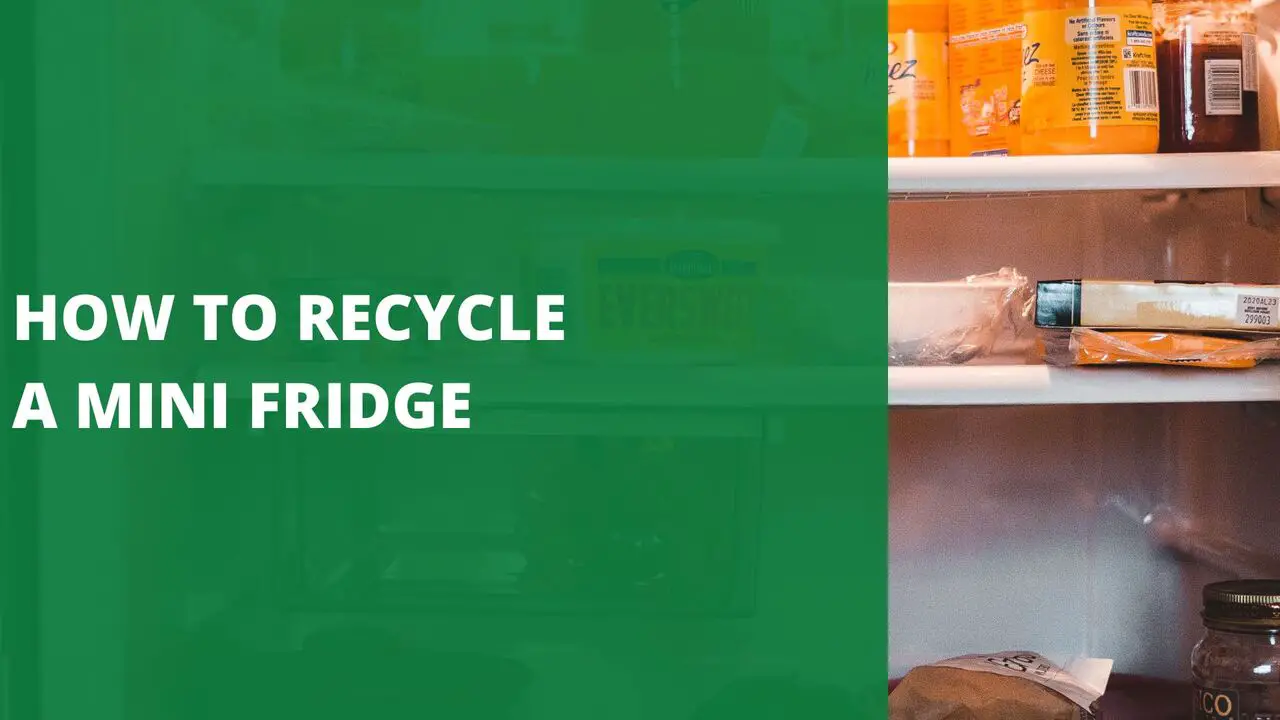If you have an old mini fridge, you can give it a new life. If it’s still working, you can donate or sell it. If it’s broken, recycle it or ask professionals to dispose of it safely. Check local rules before getting rid of it. You can also get creative by turning it into a minibar or planter. Whatever you choose, you’re helping the environment.
Here’s what you’ll find:
- A fast way to check your fridge’s condition
- Easy, eco-friendly ways to ditch it
- Tips for dealing with hazardous stuff safely
- How to navigate your town’s rules
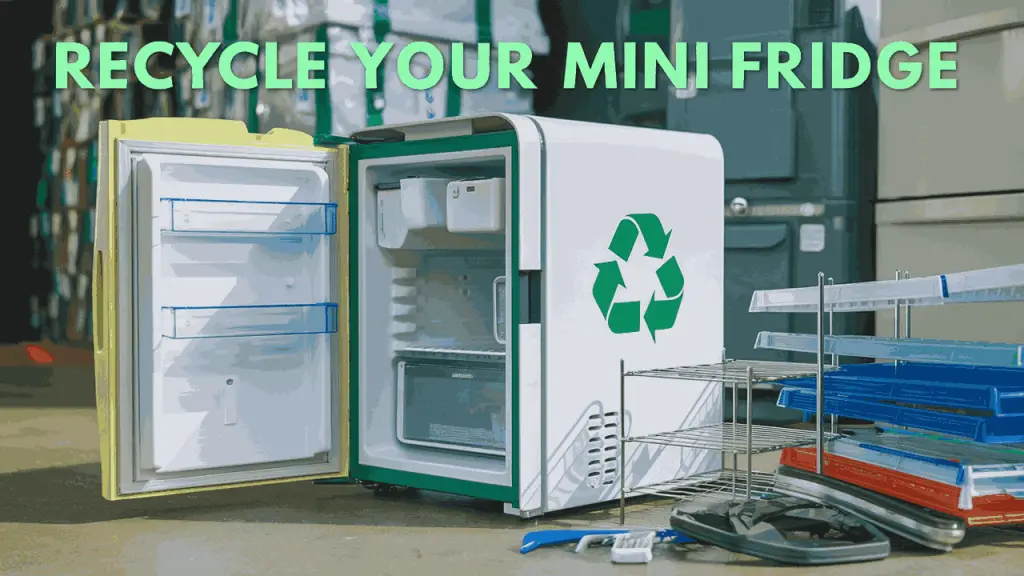
Understanding the Importance of Proper Mini Fridge Disposal
A. Safety concerns and legal regulations
When disposing of your mini fridge, you must consider safety and legal requirements. Proper disposal is crucial to prevent accidents especially involving children.
The Refrigerator Safety Act mandates removing refrigerator doors to eliminate potential hazards. You should also be aware of local regulations regarding the disposal of large appliances.
B. Environmental impact of improper disposal
Improper mini fridge disposal can harm the environment. You should consider eco-friendly options like recycling or donating.
The EPA’s Responsible Appliance Disposal (RAD) Program ensures proper handling of hazardous materials. Here’s a comparison of disposal methods:
| Method | Environmental Impact |
| Recycling | Low impact, materials reused |
| Donation | Low impact, extends appliance life |
| Repurposing | Low impact, reduces waste |
| Improper disposal | High impact, potential pollution |
C. Hazardous materials in mini fridges
Your mini fridge contains hazardous materials that require special handling:
- Refrigerants (e.g., R-22 freon)
- Insulation
- Electrical components
These materials can be harmful if not disposed of correctly. Only certified professionals should handle refrigerants to ensure safe removal and disposal.
Now that we’ve covered the importance of proper mini fridge disposal, let’s move on to assessing your mini fridge’s condition to determine the best course of action.
Assessing Your Mini Fridge’s Condition
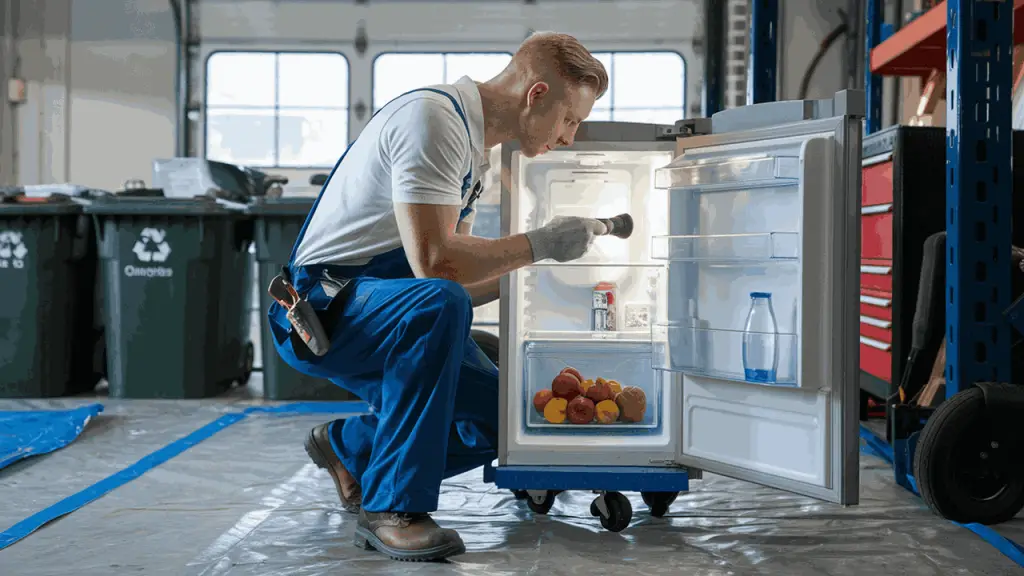
This step is crucial in determining the best course of action for your mini fridge.
A. Determining if the fridge is functional
You can evaluate your mini fridge’s functionality by considering its age and performance. Mini fridges typically last 5-15 years. Check if it maintains proper temperatures:
| Compartment | Ideal Temperature |
| Fridge | 35°F – 40°F |
| Freezer | 0°F or below |
B. Checking for potential hazards or damage
Inspect your mini fridge for visible damage or potential hazards. Look for:
- Frayed power cords
- Unusual noises
- Leaks or moisture buildup
- Inconsistent cooling
With this assessment complete, you’ll be better equipped to explore options for functional mini fridges, which we’ll discuss in the next section.
Options for Functional Mini Fridges
Here are three eco-friendly ways to give your mini fridge a new home
A. Selling through online platforms
- List of popular marketplaces:
- Facebook Marketplace
- Craigslist
- eBay
B. Donating to charities or individuals in need
| Organization Type | Benefits |
| Local charities | Support community |
| Schools | Aid student housing |
| Shelters | Help those in need |
C. Giving away to friends or family
You can offer your mini fridge to friends or family members who might need it for a dorm room or small apartment. This option ensures your appliance finds a new home quickly and easily.
Recycling Your Mini Fridge
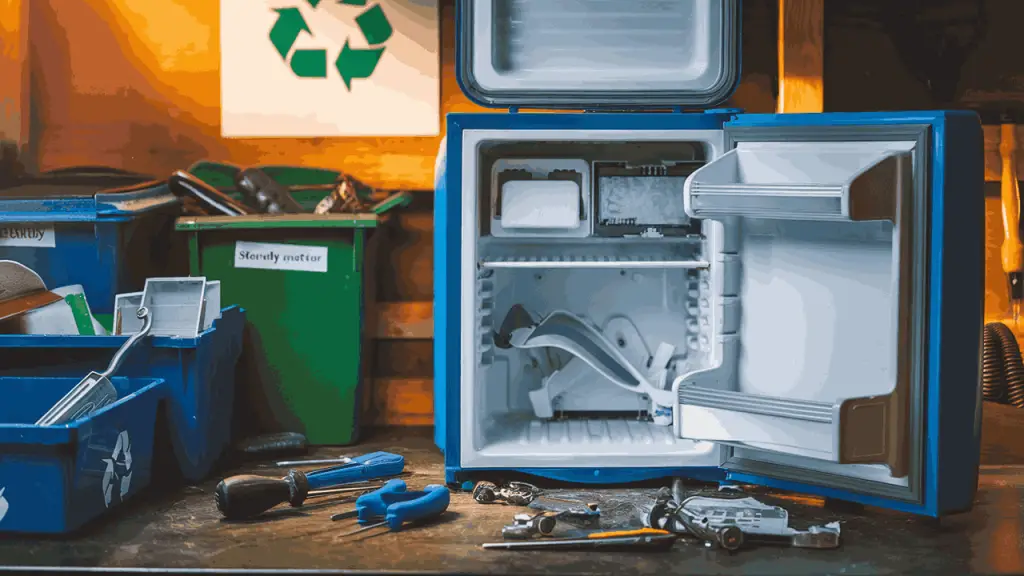
Now that we’ve explored options for functional mini fridges, let’s delve into the process of recycling your mini fridge when it’s no longer usable.
A. Finding local recycling centers and programs
You can start your recycling journey by searching for local recycling centers that accept mini fridges. Many communities have dedicated facilities for appliance disposal. To find these centers:
- Check your local waste management website
- Contact your municipal authorities
- Look for transfer stations in your area
Remember, it’s crucial to choose a center that participates in responsible disposal programs to ensure the proper handling of hazardous materials.
B. Understanding the EPA’s Responsible Appliance Disposal (RAD) Program
The EPA’s RAD Program is an essential initiative for environmentally friendly mini fridge disposal. Here’s what you need to know:
- RAD ensures proper handling of refrigerants and insulation materials
- It prevents the release of harmful substances into the environment
- Participating centers follow strict guidelines for recycling appliances
When searching for a recycling center, prioritize those that are part of the RAD Program for the most eco-friendly disposal option.
C. Checking for incentives from state energy offices or local utilities
You might be surprised to learn that recycling your mini fridge could come with financial benefits. Here’s how to explore potential incentives:
- Contact your state energy office
- Reach out to your local utility company
- Look for special recycling events in your area
Some programs, like the one offered by BGE, provide rewards for recycling appliances:
| Appliance Type | Reward Amount |
| Refrigerator/Freezer | $50 |
| Mini Fridge | $25 |
| Room Air Conditioner | $25 |
| Dehumidifier | $25 |
To qualify for these incentives, ensure your mini fridge is in working condition, clean, and defrosted. Be aware of any limitations on the number of appliances you can recycle within a specific timeframe.
By following these steps, you’re not only disposing of your mini fridge responsibly but also potentially earning a reward for your efforts.
Professional Disposal Services
Now, let’s explore professional disposal services that can make the process even easier for you.
A. Appliance removal companies
When you’re looking for a hassle-free way to dispose of your mini fridge, appliance removal companies can be an excellent choice. These specialized services offer several benefits:
- Convenience: They handle all aspects of removal, from pickup to disposal.
- Expertise: They’re well-versed in proper disposal methods and regulations.
- Environmental responsibility: Many prioritize eco-friendly disposal practices.
One such company is LoadUp, which offers a streamlined service for mini fridge disposal. Here’s what you can expect:
| Feature | Description |
| Coverage | Available in all 50 states |
| Booking | Easy online scheduling |
| Pricing | Upfront, no hidden fees (starting around $80) |
| Pickup options | In-home or outdoor (with a $5 discount) |
| Environmental focus | Encourages recycling and donation when possible |
To prepare your mini fridge for pickup by LoadUp or similar services:
- Disconnect the fridge
- Empty all contents
- Defrost completely
- Clean thoroughly
B. Junk removal services specializing in eco-friendly disposal
If you’re particularly concerned about the environmental impact of your mini fridge disposal, consider using junk removal services that specialize in eco-friendly practices. These companies go the extra mile to ensure your appliance is disposed of responsibly.
JunkKing is an example of such a service. They offer:
- Routing of appliances to charitable organizations when possible
- Recycling of components that can’t be reused
- Proper handling of hazardous materials
- Transparent pricing structure
By choosing an eco-friendly disposal service, you’re ensuring that:
- Metals, plastics, and glass are recovered and recycled
- Hazardous substances like mercury and refrigerants are handled safely
- The environmental impact of your mini fridge disposal is minimized
With professional disposal services taking care of your mini fridge, you can rest easy knowing it’s being handled responsibly.
Next, we’ll delve into the important topic of handling hazardous components, which is a crucial aspect of mini fridge disposal that these professional services are well-equipped to manage.
Handling Hazardous Components
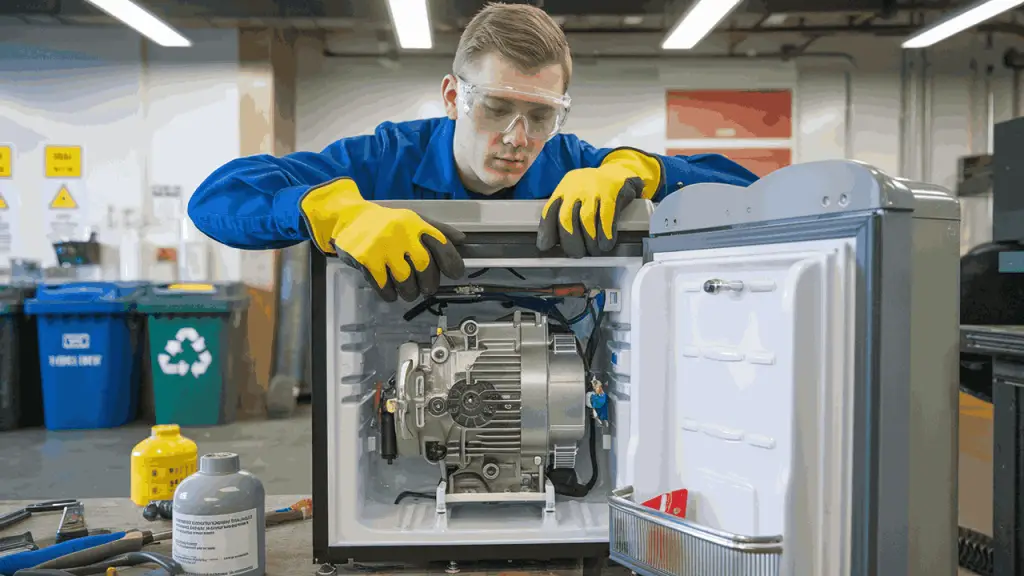
This step is crucial for ensuring eco-friendly and safe disposal.
A. Proper removal of refrigerants
You must handle refrigerants with extreme care due to their environmental impact. Contact a certified technician to safely remove and dispose of these chemicals.
Many recycling centers participating in the EPA’s Responsible Appliance Disposal (RAD) Program can assist you with this process.
B. Safe disposal of insulation materials
| Material | Disposal Method |
| Foam insulation | Recycling center |
| Fiberglass | Sealed bag in regular trash |
C. Importance of professional handling for older models
You should always consult professionals when dealing with older mini fridges, as they may contain hazardous materials like CFCs or HCFCs. These substances require special handling to prevent environmental damage.
Additionally, if your fridge has a water filter, it’s important to dispose of it properly. Learn how in our detailed guide on How to Dispose of Used Refrigerator Water Filters.
With proper disposal complete, you can explore creative repurposing ideas for your old mini fridge’s non-hazardous components.
Creative Repurposing Ideas
Now, let’s explore some creative ways to repurpose your old mini fridge.
A. Transforming shelves into decorative items
You can turn your mini fridge’s shelves into unique decor pieces. Consider these ideas:
- Wall-mounted shelves
- Plant holders
- Rustic coolers
- Mini glasshouses
B. Using components for DIY projects
| Component | DIY Project |
| Doors | Functional shelves |
| Drawers | Planters |
| Body | Outdoor table |
| Interior | Wine cellar |
Next, we’ll explore local disposal regulations and resources to ensure you’re following proper guidelines for any remaining parts.
Local Disposal Regulations and Resources
A. Contacting waste management for specific guidelines
Before disposing of your mini fridge, it’s essential to reach out to your local waste management authority.
They can provide you with specific guidelines tailored to your area, ensuring you comply with local laws and environmental regulations.
B. Utilizing bulk trash pick-up days
Many communities offer bulk trash pick-up days, which can be an excellent opportunity to dispose of your mini fridge. However, it’s crucial to verify the following details with your local waste management:
- Acceptable items for bulk pick-up
- Any preparation required (e.g., removing doors)
- Pick-up schedule and registration process
C. Exploring transfer station options
Transfer stations are another valuable resource for mini fridge disposal. Here’s a comparison of transfer station benefits:
| Benefit | Description |
| Proper handling | Ensures hazardous materials are disposed of correctly |
| Recycling options | Allows for recycling of various components |
| Convenience | Often more accessible than specialized recycling centers |
Remember to check with your local transfer station about their specific policies for accepting mini fridges and any associated fees.

